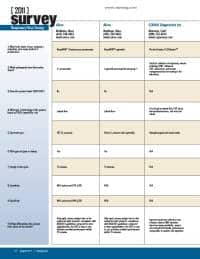BioTrove Inc, Woburn, Mass, and Gene Express Inc, Toledo, Ohio, have received a two-year National Institutes of Health (NIH) grant for their proposed novel research of genetic biomarkers for lung cancer.
The project will merge BioTrove’s nanofluidic polymerase chain reaction (PCR) technology platform, Gene Express standards for PCR measurement, and clinical expertise from Mount Sinai School of Medicine
“The exciting thing about this project is that we are combining proven PCR technologies and existing genetic knowledge to create a new tool with the potential to significantly impact patient care and treatment options for this deadly disease,” said Professor Tony Godfrey, PhD, principal investigator and associate professor of pathology and cardiothoracic surgery at the Mount Sinai School of Medicine. “Because a successful outcome would mean simplified workflow and reduced reagent and sample requirements, the NIH review committee recognized the high significance and potential impact of this project.”
As part of Innovative Technologies for Molecular Analysis of Cancer, the NIH competitive-grant program, the project will combine for the first time BioTrove’s OpenArray™ nanofluidic PCR-technology platform, Gene Express standards for PCR measurement, and the clinical expertise of the Mount Sinai School of Medicine, with the goal of creating a standardized genetic-profiling test for indicators of lung-cancer risk.
To produce the novel standardized nanoarray PCR (SNAP) gene-expression profiling system, the collaboration will combine the Gene Express standardized RT PCR (StaRT-PCR)- standards method to control for false negatives and false positives, the BioTrove OpenArray nanofluidic PCR platform to enable large-scale analyses with minimal sample requirements, and TaqMan® fluorogenic-labeled probes to enable specific detection of PCR products.
The resulting SNAP system will provide the same quality and dynamic range of standard real-time quantitative PCR, but with simplified workflow and reduced sample requirements—an important consideration when dealing with limited clinical samples.
“A real need exists for point-of-care gene-expression analysis, but without standardized measurements for expression patterns, current technology cannot produce reliable results—analysis can vary from lab to lab,” said David Lester, PhD, and executive VP in corporate development for Gene Express. “By combining our StaRT-PCR standards with OpenArray technology, we hope to provide a faster, more efficient and more reliable means to evaluate genetic markers related to lung-cancer risk, helping doctors provide better care to their patients.”
The SNAP system is designed to accelerate and control PRC analysis of biomarkers for lung-cancer risk. The OpenArray system allows scientists to conduct up to 3,072 independent PCR analyses simultaneously on up to 144 samples in a plate the size of a microscope slide, while StaRT-PCR standards offer a novel method to control for consistent results. Once developed, the tool will be evaluated independently at the Harvard School of Dental Medicine and the Stanford University Genome Technology Center.
“NIH support for this effort speaks to the real viability, and need, for a reliable, convenient SNAP system to evaluate lung-cancer risk,” said Colin J.H. Brenan, PhD, BioTrove’s chief technology officer. “Combining three proven technologies, and the expertise of Dr Godfrey, is an exciting opportunity for BioTrove to apply our OpenArray technology toward enabling a viable screening aid for physicians to help improve patient care.”



